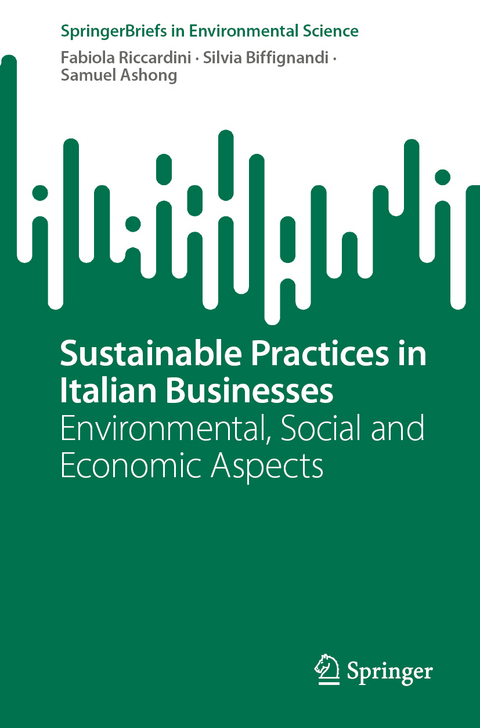
Sustainable Practices in Italian Businesses
Springer International Publishing (Verlag)
978-3-031-28176-1 (ISBN)
This SpringerBrief describes the development and use of a synthetic indicator to assess different degrees of sustainability adoption by economic sector and businesses size. To make this analysis a theoretical framework which involves variables common to alternative frameworks (specifically ESG, GRI and Istat) is proposed. The empirical analysis focuses on the environmental, social and economic variables of the Italian businesses. In this analysis, all three pillars of sustainability - economic, environmental, and social - are considered.
The work begins with a review of business sustainability literature and a look into institutional frameworks for the development and measurement of the phenomena. Connections between businesses and the SDGs are examined and comparison of the classifications of sustainable activities defined by GRI and ESG international standards is used to define a framework to be adopted to analyse ISTAT Business Census. Selected indicator variables are aggregated with a synthetic indicator and the results are presented (this is a new proposal of a synthetic indicator useful for the type of data used and published by ISTAT - Italian National Statistical Institute), discussing pros and cons of using it. This study provides two important innovative contributions. The first one is about how to approach the theoretical framework of businesses sustainability at firms aggregated level. The basic idea to work on a set of variables common to different approaches is interesting from the interpretative point of view. The second one, is about the specific empirical analysis, i.e. the Italian businesses sustainability situation. The investigation based on this new theoretical classification/framework and the new proposed indicator provides some interesting substantive results.lt;b>Fabiola Riccardini is an economist, specialized in International Economy and Quantitative Methods. She is Chair of Research and Training on Sustainable Wellbeing and Development Association. She is managing research projects on business and sustainable development at ISTAT. She was Co-Chair of Inter-Agency Expert Group- SDGs Indicators of United Nations. She is teaching "sustainability and well-being" at Universities, and is author of many scientific articles and books. She worked at OECD Statistical Directorate on well-being and sustainability measures. She represented Italy in many working groups of European Commission, OECD and United Nations. She was Co-Chair of Information Economy WG at OECD and was Head at ISTAT for the new surveys on ICT of Enterprises and e-Commerce and Information Society statistics, and surveys on Business and Households Services, contributing to the first OECD Manual on Information Society Statistics. Previously she was Chair of the Evaluation Committee of European Training for European Official Statisticians.
Silvia Biffignandi is acting as a research consultant in economic statistics; is retired full professor Economic Statistics at Bergamo University. She participated and presented her papers in many international conferences, she published in many journals, including the JOS, the Statistical Journal of the IAOS. She has published several books, also by outstanding international editors. She has leaded as a coordinator/unit responsible many national and international projects (Eurostat, Ministry of Research, others).
She has a record of international past and ongoing collaborations with leading statistical bodies (Eurostat, Istat, other NCIs); collaboration with several university experts both in Europe and oversee are ongoing on innovative research.Main research interests are on Official statistics and socio-economic analyses, topics like sustainability measurement and analysis, administrative data, sources integration, sampling, surveys methodology and panels construction (especially web).
Samuel Ashong is an independent researcher with an interest in statistical methods, data science, and sustainable development. He currently has a master's degree in Economics and Data Analysis (European Master in Official Statistics) from the University of Bergamo, Italy and following a PHD programme at the same University. He holds a bachelor of science degree in Statistics from KUNST, Ghana. He has work experience with the Businesses,Well-being and Sustainable Development Studies Unit at ISTAT, Italy, and he also worked as an environmental, health and safety officer at a cement production company in Ghana. He is currently involved in research projects on sustainable practices of businesses.
Chapter 1: Background and Literature.- Chapter 2: Developing a Synthetic Index of Business Sustainability.- Chapter 3: Application of the Sustainability Index: Sustainability in Italian Businesses.- Chapter 4: Conclusions.
| Erscheinungsdatum | 11.06.2023 |
|---|---|
| Reihe/Serie | SpringerBriefs in Environmental Science |
| Zusatzinfo | VII, 153 p. 36 illus., 32 illus. in color. |
| Verlagsort | Cham |
| Sprache | englisch |
| Maße | 155 x 235 mm |
| Gewicht | 260 g |
| Themenwelt | Naturwissenschaften ► Biologie ► Ökologie / Naturschutz |
| Naturwissenschaften ► Geowissenschaften | |
| Sozialwissenschaften ► Politik / Verwaltung | |
| Schlagworte | Business sustainability • Corporate Conduct • Environmental, social and economic sustainabiity • ESG • GRI • SDGs • Sustainability Indicators |
| ISBN-10 | 3-031-28176-4 / 3031281764 |
| ISBN-13 | 978-3-031-28176-1 / 9783031281761 |
| Zustand | Neuware |
| Informationen gemäß Produktsicherheitsverordnung (GPSR) | |
| Haben Sie eine Frage zum Produkt? |
aus dem Bereich


